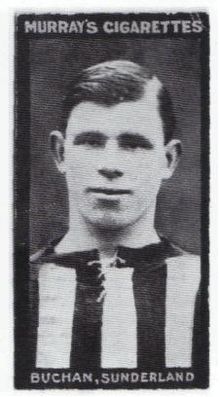Charlie Buchan

Buchan on a cigarette card issued in 1911
|
|||
| Personal information | |||
|---|---|---|---|
| Full name | Charles Murray Buchan | ||
| Date of birth | 22 September 1891 | ||
| Place of birth | Plumstead, London, England | ||
| Date of death | 25 June 1960 (aged 68) | ||
| Place of death | Monte Carlo, Monaco | ||
| Playing position | Centre forward | ||
| Senior career* | |||
| Years | Team | Apps | (Gls) |
| 1909–1910 | Woolwich Arsenal | 0 | (0) |
| 1910–1911 | Leyton | ||
| 1911–1925 | Sunderland | 379 | (209) |
| 1925–1928 | Arsenal | 102 | (49) |
| National team | |||
| 1913–1924 | England | 6 | (4) |
| * Senior club appearances and goals counted for the domestic league only. |
|||
Charles "Charlie" Murray Buchan (22 September 1891 – 25 June 1960) was an English football player and writer.
Buchan's playing career started with Arsenal (then Woolwich Arsenal) before he moved to Leyton, and then onto a prolific fourteen-year period with Sunderland: he was Sunderland's leading scorer for seven of his nine seasons with the club, and remains the club's all-time record League goalscorer. He won the Football League First Division with Sunderland in 1913 and was a losing finalist in the 1913 FA Cup Final. During his period with Sunderland Buchan served with the Sherwood Foresters after the outbreak of the First World War, being awarded the Military Medal.
He re-joined Arsenal in 1925 and was a losing finalist again in Arsenal's first FA Cup final in 1927. Buchan was responsible, along with Herbert Chapman for Arsenal's adoption of the WM formation which eventually brought Arsenal significant success in the 1930s. He was capped six times by the England national football team, scoring four goals.
After retiring from football Buchan became a football journalist with the Daily News (later renamed the News Chronicle), wrote one of the first coaching manuals, and also commentated for the BBC. In 1947, he co-founded the Football Writers' Association, and from September 1951 until his death, he edited his own football magazine, Charles Buchan's Football Monthly, which was published until June 1974.
...
Wikipedia
